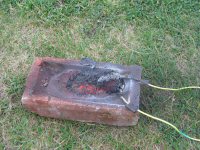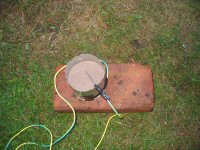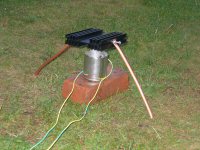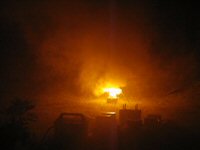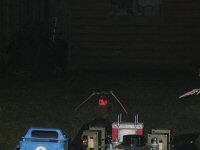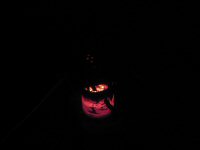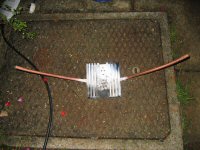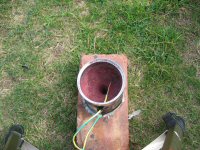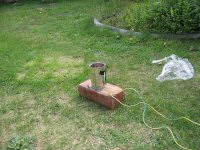Thermite
Thermite burns at incrediably high temperatures (>3000oC) and as such finds uses ranging from incendiary devices to welding.Different thermite mixtures are possible, each with there own advantages and disadvantages, but probably the most common thermite mixtures is aluminium powder and powdered iron oxide, which results in aluminium oxide and molten iron.
Fe2O3(s) + 2Al(s) --> Al2O3(s) + 2Fe(l)
Armed with the atomic weights of each of the elements in the equation we can stoichiometrically work out how much iron oxide and aluminium powder to use in the thermite.
| Element | Atomic Weight |
| Al | 26.981538 |
| Fe | 55.845 |
| O | 15.9994 |
Fe2O3(s) = (26.981538 * 2) + (15.9994 * 3) = 101.961276
2Al = 26.981538 * 2 = 53.963076
Therefore a stoichiometrically correct thermite mixture consists of 74.77% iron oxide and 25.23% aluminium powder. Other thermite mixtures will be stoichiometrically worked out as and when I use them.
The Experiments
At the moment I've only tried iron oxide thermite, but I plan to use other oxide based mixtures in the near future.More to come soon...
Experiment 1
| Iron Oxide (homemade) | 75g | |
| Aluminium Powder (250/D) | 25g |
Results
 |
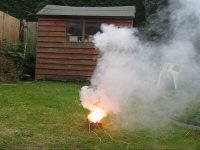 |
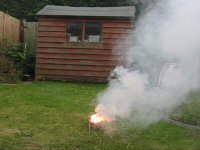 |
Once ignited with the high voltage arc the thermite continued to burn under its own heat. The burning lasted for over 1 minute and resulted in a small amount of molten iron.
Conclusion
The thermite burned for a long time but I would prefer a shorter more fierce reaction.Experiment 2
| Iron Oxide (homemade) | 75g | |
| Aluminium Powder (250/D) | 50g |
Results
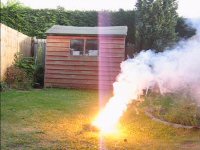 |
 |
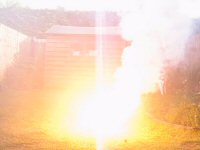 |
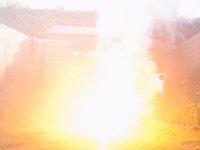 |
At this point my digital camera was becoming saturated by the bright light. As the camera only has a small memory card it stopped recording after 30 seconds (although it still has space for another 30 second movie clip). When I restarted the camera it automatically adjusted for the bright light which results in a darker background. The following 4 images are the continuation of the thermite reaction from the 4 images above.
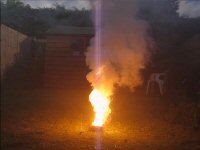 |
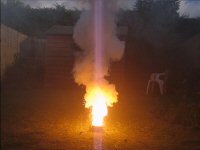 |
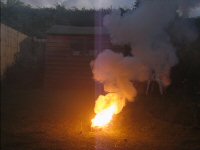 |
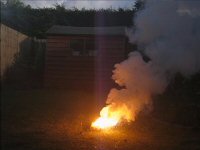 |
Conclusion
During the above reaction I was sat almost 5 meters back but I could still feel the heat on my face. The reaction was so bright that I couldn't look at it and it took my eyes almost 10 minutes to readjust.
Experiment 3
| Iron Oxide (homemade) | 117.1g | |
| Aluminium Powder (250/D) | 100g |
In this experiment I placed the thermite in a tin can which had a large aluminium heat sink suspended above it.
I actually made a mistake when mixing the Al and Fe2O3. I started with 140g of Fe2O3 and decided to mix it with 100g of Al powder. But before the mixing I again grinded and heated the Fe2O3. It was after this grinding and heating that I mixed it with the 100g of Al. When I weighed the final product it came to 217.1g, which means in the end I actually used 117.1g of Fe2O3. I suspect most of the losses were apperatus losses.
Results
The following video frames show the reaction taking place. The items in the bottom of the picture are my 4 MOT stack power supply, 20A variac and 3KVA isolation transformer.During the reaction flames could be seen coming out of the sides of the tin can. Once the reaction had finished the tin can glowed red hot for several minutes.
Suprisingly no damage was done to the aluminium heat sink. The only effect the thermite had on the heat sink was to cover it with aluminium oxide (the white powder).
Conclusion
This experiment is considered void as the weights used were incorrect.
Experiment 4
| Iron Oxide (LR Grade) | 300g | |
| Aluminium Powder (250/D) | 100g |
I was a bit disapointed with the previous results and thought they didn't really demonstrate what thermite was capable of. So for this experiment I used LR grade iron oxide. The 400g thermite was compacted into a tin can and a hole was made in the center. The purpose of the hole is to try and make the thermite burn from the top and the bottom.
Results
This experimented produced great results which gave a true demonstration of thermite. The thermite reacted very fast and produced a huge amount of heat. In fact, the reaction was so fast that I failed to capture the most dramatic part, which was the start, on video. I'm really kicking myself for not capturing the start on video.The heat of the reaction melted the tin can almost instantly and resulted in molten metal on the floor. The following images show the end of the reaction and the molten metal.
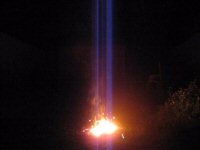 |
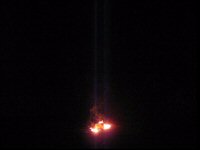 |
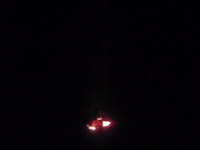 |
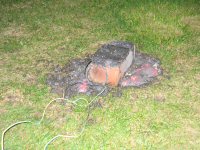 |
 |
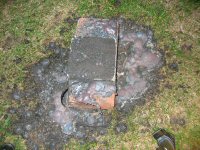 |
Conclusion
This experimented produced results which I expect from thermite. I just wish I captured the whole thing on video. This is definately one I plan to repeat. Next time I'll make sure the video is running.| Home |
